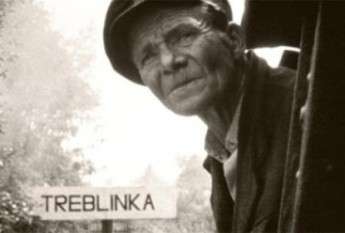Shoah

There is no proper response to this film. It is an enormous fact, a 550-minute howl of pain and anger in the face of genocide. It is one of the noblest films ever made... It is an act of witness.
Shoah is a Documentary by Claude Lanzmann about the extermination of the Jews in Nazi-occupied Europe. It is widely considered the definitive nonfiction film on the topic.
Between 1976 and 1981, Claude Lanzmann interviewed many protagonists of the Holocaust, both survivors, bystanders and former perpetrators. His film, clocking in at nine hours, is a collection of these interviews, interspersed with shots of the ruins of the extermination camps. There is, however, no archival footage whatsoever, and the horror is made all the greater by the audience having to rely on oral testimonies to imagine it, rather than actually being shown.
Several of the interviewees were "cogs in the machine", people who were just doing their jobs--it didn't matter much to them that their jobs involved making industrial-scale murder possible. As such, this film is a harrowing illustration of Hannah Arendt's line about "the banality of evil".
This page needs more trope entries. You can help this wiki by adding more entries or expanding current ones.
- Anachronic Order: The interviews aren't arranged by order of the chronological events discussed.
- Drowning My Sorrows: Many of the Russian train conductors were drunk during the long rides to the concentration camps. Without alcohol, they couldn't have done it.
- Punch Clock Villain: Played chillingly straight.